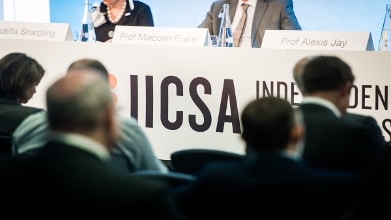
At a time when political authority seems to be unable to assert itself and rules and hierarchies are everywhere challenged, it is time to ask some questions about what might be going on in church and society. Traditionally there were patterns of deference which acted like a kind of glue holding institutions together. People belonging to structures of society, like a school or a church, knew exactly how authority functioned and who was in charge. Although the individual member might have some role to play within the whole, all major decisions were made by the people at the top. That pattern of deferring to our seniors and betters also gave us a sense of security. We could rely on their greater experience and knowledge.
The current state of collapse in our political institutions through the Brexit impasse is paralleled by a new stridency in the way that our church authorities are being constantly challenged. Last week the story covered by this blog was the confrontation by the 104 clergy of the Oxford diocese against their bishops. Whatever else was going on in the letter that was presented, it would be true to say that old-fashioned deference was far from the minds of those who signed the letter. There was more than a hint of hubris in the tone of the letter. It was saying ‘we have the bible and we control the purse strings. Do what we want or else.’ A letter in the Church Times as well as the arguments presented by this blog argued that the level of support was not perhaps not as deep as the signatories claimed. A naked threat was still there. It is not an easy time to be a senior churchman or a politician for that matter.
I began to think about this idea of deference as it touches our church and political life. The older we are, the more that this deference is going to be part of our mental structure of thinking. Just as obedience was drummed into us as children, so we accepted a naturally hierarchical model in society and in church. The words of the Prayer Book catechism come to mind. (Yes, I was made to learn it by heart!) ‘My duty towards my neighbour is to …..submit myself to all my governors, teachers, spiritual pastors and masters: to order myself lowly and reverently to all my betters’. Reading these words after sixty years helps me to appreciate what a different society we live in now. In many ways life then was easier for the ‘betters’ and those they controlled. Everyone knew their place and so there was less conflict or challenge to the status quo.
How have things really changed in our churches? The most obvious thing to be seen now is that more opinions are being heard in church discussions. Lay insights are being taken seriously. The thoughts of bishops are not given automatic priority in the marketplace of discussion. The internet has also increased the cacophony of voices being heard within the church. A blogger in a remote part of the world can say things that may be heard in bishop’s palaces. Deference is not a word that would describe much of what is going on today in our church life.
The pattern of old-fashioned deference and obedience does however continue in one area of the church. Ironically the congregations that do the most to question and undermine the authority of the leaders that oversee their churches are those that practise the greatest level of control over the details of members’ lives. I am of course referring to conservative evangelical groups. Up and down the country we find places where high levels of control and obedience are enforced. While the local leadership is questioning and challenging the bishops set over them, a tight level of supervision is often exercised over the people in the pew at the same time. This will particularly touch on such things as acceptable beliefs, money choices and the conduct of intimate sexual relationships. Obviously, this kind of biblical control is less common in Anglican settings than it is in the independent Pentecostal/evangelical congregations. But it still exists as a strong feature of church life in many centres. To take up membership of one of these churches, Anglican or not, one is required to regress, in terms of social attitudes, at least 40 years. There, deference and obedience are being demanded, not to ‘masters and betters’, but to a cadre of controlling clergy and ministers in the name of biblical truth. You will be expected to obey, defer to authority and allow your whole life to be controlled in exchange for the promise of salvation.
The deference and obedience that was built into the catechism generation has long gone. Politicians, police chiefs and church leaders no longer can assume the respect of the rest of society. It is only in conservative Christian congregations, some Anglican, that such attitudes continue to exist. Most of us, who do not belong to churches in this tradition, would claim that such deference is a harsh form of control rooted in fear and paranoia. Whatever we think of the failure of deference in society at large, this fear-laden Christian version that is found in conservative congregations is not highly regarded by the rest of society. We would also claim that it has little or nothing to offer to the enjoyment and celebration of ‘life in all its fullness’.








